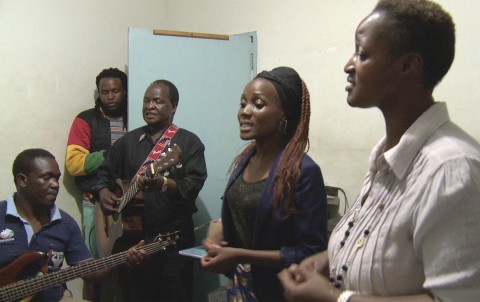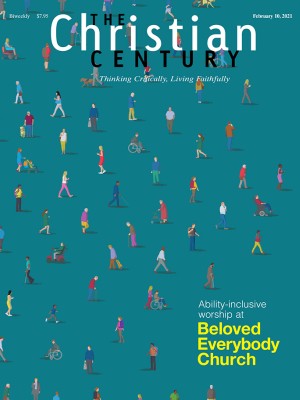Machanic Manyeruke and the gospel music scene in Africa
James Ault’s new documentary offers a window into a vast and exciting musical world.

In his new documentary Machanic Manyeruke: The Life of Zimbabwe’s Gospel Music Legend, filmmaker James Ault reminds us of the effervescent worship culture that thrives across Christian Africa. So much of this music will be instantly recognizable to Western viewers, in its themes as well as its instruments—Machanic Manyeruke shattered convention by bringing electric guitars into praise music. Yet at every point, this music has its own African identity.
Born in 1942, Manyeruke began his musical career in the Salvation Army in the 1960s. (He earned the name Machanic because he was constantly tinkering with machinery as a child.) By the 1980s, he and his group, the Puritans, were profiting from a gospel music boom in newly independent Zimbabwe.
Read our latest issue or browse back issues.
The high points of Ault’s film, which is available to stream for free on Vimeo, are the concert performances and the responses of the very enthusiastic crowds. Manyeruke’s music ranges widely in its themes. It includes some general (and very catchy) songs of praise and devotion: “God, you’re good, you’re wonderful!” Other songs present memorable renderings of biblical stories as a form of study and evangelism. Some familiar passages acquire a powerful new resonance in a society deeply concerned with spiritual warfare. Manyeruke’s song about the man possessed by evil spirits, by Legion, has the chilling chorus line “Demons . . . in the graveyard!”
In one striking scene, Manyeruke is talking with a member of a group presenting the traditional mhande dance and drumming of the Shona people. The man is the son of a n’anga, what suspicious Europeans once called a witch doctor. But as he explains, his father loved Manyeruke’s music, and the two men chat congenially about the points of belief they share. As they agree, how could anyone doubt that God wisely guides all things? Manyeruke is at once passionately Christian and absolutely comfortable with the cultural inheritance of that traditional world. His own father performed the mhande.
Manyeruke’s songs are in the Shona language and are aimed strictly at that ethnic group. He is by no means the only gospel legend in Zimbabwe—his story is a splendid sample of a much larger story. He is usually counted among a group of five celebrated pioneers whose careers took off around the same time and who inspired a substantial cohort of imitators. But wherever you look in Africa, there are parallels—other modern-day “Puritans” who set Christian and biblical themes to popular music. In the process, they created a vast recording and publishing industry in which it is all but impossible to draw a line between gospel and the broader category of contemporary Christian music.
There are also parallels in African American music, in which singers who start off in church worship settings evolve to become more general entertainers. But a sizable number of Zimbabwe’s successful artists are still very consciously evangelistic, and they treat their recordings as an extension of their evangelistic work. Many continue to work as pastors or worship leaders.
Various singers and groups differ as to whether they use native languages or English, which could give them international appeal. The use of English is encouraged by London’s role as an African cultural metropolis, as well as by the growing importance of African migrant communities in the United States. Plenty of rising stars in “African gospel music” are in fact based in thoroughly African diaspora settings in London. “UK gospel” is its own genre. Some of the stars recording in English have developed huge global followings. Ghana’s powerhouse Sonnie Badu is a classic example, and Kenya has a sprawling world of successful artists.
As with so much else on the continent, the most vibrant gospel music cultures are those of South Africa and Nigeria. In the mid-1980s, Paul Simon introduced South African music to a wider world with his collaboration with Ladysmith Black Mambazo, but the sheer abundance of modern-day gospel performers defies simple listing. Some of the most powerful acts are church choirs, like the Soweto Gospel Choir. For many years, Rebecca Malope earned her reputation as the African queen of gospel. The sudden death in 2017 of Lundi Tyamara created national shock and mourning reminiscent of the loss of Selena in the United States.
Nigeria’s Sinach amply illustrates the process of musical globalization. She is a worship leader at Lagos’s enormous LoveWorld megachurch (Christ Embassy), which operates ministries in multiple countries. The church runs its own record label, with a wide range of gospel stars. In 2015, Sinach released the song “Way Maker,” which has subsequently been translated into more than 50 languages. In 2020, Sinach became the first Nigerian artist to win a Dove Award from the US-based Gospel Music Association when “Way Maker” was awarded song of the year.
We live in a great age of popular Christian music, and so much of it is coming out of Africa.
A version of this article appears in the print edition under the title “The great age of African gospel.”







